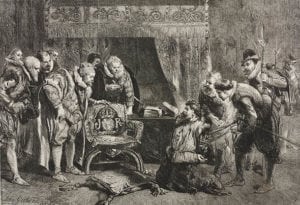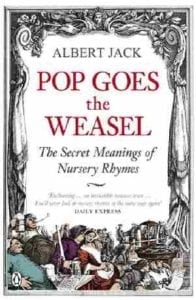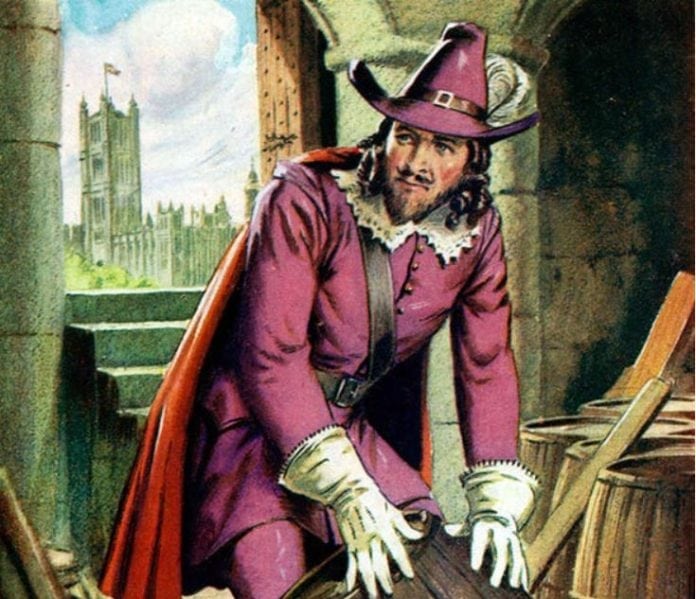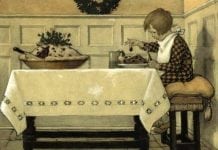Living in our high-tech world, it is difficult to imagine a time when it was impossible to link up to the planet at large, and everyone on it, at the touch of a button or a single click of a mouse.
It is only seventy years since the cinema, followed by television, began to bring news to the select few. Events reported were two days old but that was instantaneous compared with former times.
After the Battle of Trafalgar in 1805, for instance, nobody in England knew about the great victory, or Nelson’s death, for months.
So think back to the year 1605, a time when very few people could read and the only news of national importance would be when King James’s army turned up at your remote farm to recruit men for yet another war in God’s name.
Many lived their entire lives in blissful ignorance of the wider world. James I was the first monarch of the new dynasty (reigning from 1603 to 1625) and hence his position was rather less stable than he would have liked – as a celebrated attempt on his life only two years into his rule was to prove.
Extract from Pop Goes the Weasel by Albert Jack
His government had to find a simple and effective way of delivering its message to the far corners of the land, as quickly as possible. And as most country folk could neither read nor write, this would have to be done by word of mouth.
An easily memorable rhyme or limerick would do the trick admirably –encapsulating important news and, in this case, providing a stern warning in just a few snappy lines.
So when Robert Catesby led his gang of religious terrorists – thirteen men, including the hapless Guido (Guy) Fawkes – in the most famous failed terrorist attack in English history, the king needed to make sure all of his subjects were made aware of the dastardly plot and warned against entertaining similar ideas.
Catesby’s gang had planned to blow up the house of Parliament on its first day of the new session on 4 November 1605: the king and many other powerful Englishmen would have been killed at a single stroke.
The idea was to incite rebellion and restore a Catholic head of state by putting King James’s nine-year-old daughter Elizabeth on the throne. Catesby’s plan was to pack the cellars of the Houses of Parliament with as much gunpowder as could be smuggled in.

One of the men, Guy Fawkes, an explosives expert, would hide in the cellars all night long and then light a fuse to explode the barrels as soon as the king and his court were sitting directly above the cellars the following day.
But a member of the gang tipped off a family friend due to attend the opening of Parliament and that friend informed the authorities. Fawkes was caught, quite literally, with his hand on the fuse and the assassination attempt was foiled.
A recent television re-enactment of the Gunpowder Plot has proved that, had it been successful, it would have certainly wiped out most of the great and good of the English ruling classes.
During the re-enactment, the resulting controlled explosion was so severe that the head of the mock king was blown to the other side of the River Thames.
Condemned for high treason, Guy Fawkes’s body parts could likewise be found all over London after their owner had been hanged, drawn and quartered.
His mutilated body was displayed as a deterrent to others and a warning of the seriousness of treason. His head was placed on a pike at the Tower of London where the ravens pecked his skull clean.
The following year, a sermon was commissioned by Parliament to commemorate the foiling of the plot and the survival of the monarchy, and an annual custom was thereby established.
The prominent clergyman Lancelot Andrewes (co-compiler of the King James Bible) first read the sermon and then recited the verse to be remembered and repeated as worshippers returned to their towns and villages throughout England.
Remember, remember the fifth of November,
Gunpowder, treason and plot;
I see no reason why gunpowder, treason
Should ever be forgot.
Guy Fawkes, Guy Fawkes, it was his intent
To blow up the King and the Parliament;
Three score barrels of powder below,
Poor old England to overthrow.
By God’s providence he was catch’d
With dark lantern and lighted match;
Holler boys, holler boys, make the bells ring,
Holler boys, holler boys, God save the King.
That year, loyal townsfolk formed lamplit processions in honour of the king and built huge fires on which they burned effigies of the conspirators in what was to be repeated as an annual reminder of what happens to those who commit treason and threaten the monarchy.
Fireworks were later introduced to replicate the explosion that might have taken place.
Such bonfires were normal at the time, with effigies of England’s ‘enemies’ burned on a regular basis at village greens throughout the land, although these days, thanks to ‘Remember, remember the fifth of November’, it is specifically the Gunpowder Plot of 1605 that is never forgotten.
Children soon began a tradition that has continued ever since of stuffing old clothes with paper and hay and displaying their flammable models of Guy Fawkes on street corners, asking passers-by for a penny for their efforts.
‘A penny for the guy, mister?’ became a familiar cry, although the last street urchin I passed asked for a fiver, demonstrating once again how times have changed. – Albert Jack
Albert Jack AUDIOBOOKS available for download here

Pop Goes the Weasel – Nursery Rhyme History



































